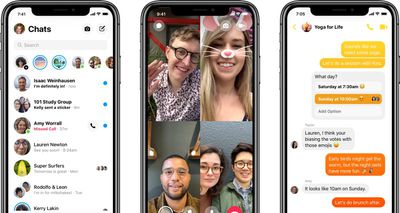Facebook CEO Mark Zuckerberg is planning to integrate three disparate messaging services -- Facebook Messenger, Instagram messaging, and WhatsApp -- into one "underlying messaging infrastructure" (via The New York Times).

These services will continue to operate as their own standalone apps, but the company's work will make them interoperable with one another. This means that a Facebook user could send an encrypted message to someone who only has a WhatsApp account, and vice versa. The company is still in the early stages of the unification, with plans to be finished by the end of 2019 or early 2020.
According to sources familiar with the plans, Zuckerberg's idea is the newest effort to keep people within the Facebook ecosystem, and off of rival texting apps like iMessage.
Mr. Zuckerberg has also ordered all of the apps to incorporate end-to-end encryption, the people said, a significant step that protects messages from being viewed by anyone except the participants in the conversation.
By stitching the apps’ infrastructure together, Mr. Zuckerberg wants to increase the utility of the social network, keeping its billions of users highly engaged inside its ecosystem. If people turn more regularly to Facebook-owned properties for texting, they may forgo rival messaging services, such as those from Apple and Google, said the people, who declined to be identified because the moves are confidential.
In an official statement, Facebook said it's "working on making more of our messaging products end-to-end encrypted and considering ways to make it easier to reach friends and family across networks," alluding to the upcoming change. As of now, WhatsApp is the only one of the three main Facebook messaging apps to support secure end-to-end encrypted text messages, which ensures that texts are only read by you and the person you send them to.
This also raises privacy concerns for Zuckerberg's plans, since it's unclear how an end-to-end encrypted app would integrate with apps like Facebook Messenger. To sign up for WhatsApp, only a phone number is needed, but in contrast personal identities are the central part of apps like Facebook and Instagram, including their messaging services.
Today, WhatsApp requires people to register only a phone number to sign up for the service. By contrast, Facebook and Facebook Messenger ask users to provide their real identities. Matching Facebook and Instagram users to their WhatsApp handles could give pause to those who prefer keeping their use of each app compartmentalized.
In the wake of last year's Cambridge Analytica scandal, internal sources state that Zuckerberg has renewed his focus on WhatsApp and Instagram as the main Facebook brand was hit hard with negativity. In September, Bloomberg reported that Instagram was expected to soon become "more tightly integrated" with Facebook, in the wake of Instagram co-founders Kevin Systrom and Mike Krieger leaving Facebook.
WhatsApp founders Jan Koum and Brian Acton have also left Facebook for similar reasons. According to today's reports, employees are still clashing with Zuckerberg over the new shift in focus to WhatsApp and Instagram, with dozens of WhatsApp employees arguing with Zuckerberg over the upcoming messaging integration plan on internal message boards, as well as during a "contentious" staff meeting last month.
During this meeting, WhatsApp employees reportedly asked Zuckerberg why he was so focused on making the messaging services integration a priority for 2019. According to sources, his responses were "vague" and "meandering," and as a result several WhatsApp employees have left and more are planning to leave because of the plan.
























Top Rated Comments
The Big Brother just upped the game.
Should this topic be under the politics, etc. section?
[doublepost=1548431004][/doublepost]It's what a majority of the population use. As much as I love iMessage, there are those that don't want to fork over the cost for an Apple device. As such, I've relied on WhatsApp just as much as iMessage to communicate with people.